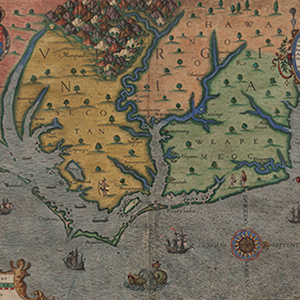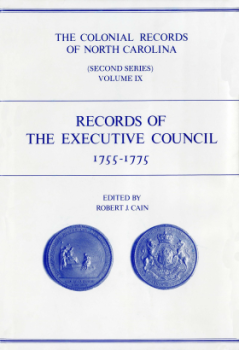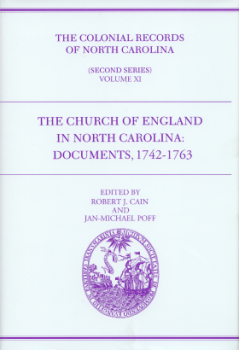History of the North Carolina Colonial Records Project
About
Although the North Carolina Colonial Records Project is now digitial and hosts exhibits and editions on MosaicNC.org, the program originally started as a print publication. Since 1961, the North Carolina Colonial Records Project has sought to increase accessibility to the State’s colonial, revolutionary, and early national history.
To realize this goal, the project originally published a series of printed volumes containing documents foundational to an understanding of North Carolina’s early history. It also has undertaken long-term programs of copying documents in foreign archives.
The accomplishments of both the publication and copying components of the Colonial Records Project have been recognized nationally in various ways: scholarly reviews, financial support from the National Endowment for the Humanities and numerous private sources, and through a grant of the coveted Award of Merit by the American Association for State and Local History.
Although the North Carolina Colonial Records Project is a state government program, from the beginning the project has also enjoyed substantial and crucial private support from the Carolina Charter Corporation.
Early map of colonial North Carolina
Generations of researchers are familiar with the ten-volume series The Colonial Records of North Carolina, edited by William L. Saunders and published from 1886 to 1890. This series was shortly followed by the twenty volumes of The State Records of North Carolina (1895-1911), edited by Walter Clark.
In 1963, a new series of Colonial Records was launched. The inaugural volume of The Colonial Records of North Carolina [Second Series] printed the key constitutional documents of early Carolina, such as royal charters and the Fundamental Constitutions. Volumes II-VI focused on records of the various higher courts in the colony to 1730, while volumes VII-IX concerned the Colonial Council, the body advising North Carolina's governors on the exercise of their extensive powers. The documents in volumes X-XII tell the story of the Church of England in colonial North Carolina. Volume XII was the final print edition of the Second Series and was published in early 2021.
Print copies of some volumes of the Second Series are available through our distributor, the University of North Carolina Press. Please contact UNC Press or your local bookseller to purchase copies of the printed volumes.
Volume 9 of the Colonial Records Project
The Colonial Records project's initative of locating and copying documents in foreign repositories began in 1969, and until 1993 it employed fulltime, resident researchers in England and Scotland. During these years over 75,000 items were individually described, copied (microfilmed or photocopied), and placed in the State Archives of North Carolina for use by the public. The work in both nations was supported by grants from the National Endowment for the Humanities, and by private and State funding.
The great majority of these documents had never been published previously. Even today, the Colonial Records Project draws extensively on the overseas items to illuminate North Carolina’s early history.
Volume 11 of the Colonial Records Project
An indispensable source of encouragement and support for the Colonial Record Project from its inception, the Carolina Charter Corporation has provided much of the funding for research and copying in foreign repositories. This non-profit charitable organization, with a membership drawn from public-spirited citizens of the State, sponsored the copying programs in England and Scotland, as well as a similar effort in Ireland. Major funding for the work of the Carolina Charter Corporation has come from the North Carolina Society of the Cincinnati, Z. Smith Reynolds Foundation, National Endowment for the Humanities, and the Kellenberger Foundation, in addition to gifts from numerous other organizations and individuals.



